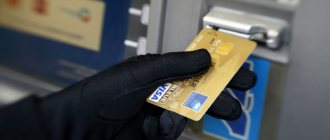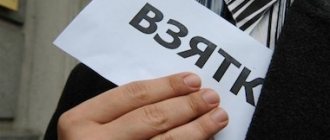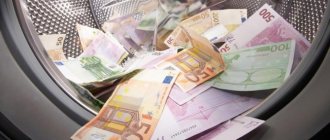The Criminal Code of the Russian Federation does not contain an article directly regulating the responsibility of citizens for illegal cash withdrawal transactions. However, a person who illegally cashed out may be subject to administrative or criminal liability - from a fine to a long-term restriction of freedom.
What is meant by illegal cashing?
As judicial practice shows, cashing out funds is a criminal act of a widespread nature. This term is used in cases where unscrupulous companies and individual entrepreneurs are engaged in withdrawing money in order to evade tax payments or transfer non-cash funds into “black cash”.
The purpose of such actions may be: to prevent the company from going bankrupt; receive unaccounted cash; fight with a competing company, etc.
As a rule, cashing out is carried out through fictitious transactions, provision of non-existent services or other types of actions that are not actually carried out or are performed using fake documents.
Illegal cash-out companies
There are many companies specifically opened for the illegal withdrawal of money from company accounts. They are also called fly-by-night companies because they do not operate for long.
Such organizations receive money into their account for supposedly rendered services.
Whether they actually turned out to be true is, as a rule, impossible to verify. These include cargo transportation, equipment setup, and various information services.
After this, the company transfers funds to the left debit cards - like salaries to employees. Cards can be purchased or issued for “dead souls”.
The shell company takes its percentage and transfers the cash to the company. Sometimes the same people are behind two organizations.
Law enforcement officers have learned to identify such scammers and bring them to justice. The Criminal Code of the Russian Federation provides for the following articles for such acts:
- Art. 199 – tax evasion;
- Art. 327 – forgery of documents;
- Art. 171 – illegal business;
- Art. 173 – false entrepreneurship;
- Art. 174, part 1 – legalization of proceeds from crime.
Cash withdrawal through individual entrepreneurship
Today, cashing out illegally by individual entrepreneurs is quite common. The following methods are used for this.
- Registration of individual entrepreneurship using a lost or stolen passport.
- Registration of fake individual entrepreneurs at the request of third parties.
- Cashing out maternity capital by citizens.
- Fictitious circulation of money through banking structures.
- Cash withdrawal using a terminal, etc.
Most often, cashing out in such cases is carried out through relatives or friends-individual entrepreneurs, who are registered to perform various types of work or provide fictitious services. In reality, such individual entrepreneurs do not perform any work, since they do not have the necessary skills and property assets for this.
Law enforcement, regulatory and inspection authorities have learned to quickly identify such operations and, accordingly, impose administrative or criminal liability on violators, depending on the severity of the crime.
Cashing through LLC
With this option, the following schemes are most popular:
- transfer of money to individual entrepreneurs;
- obtaining loans or long-term loans;
- transfer of dividends;
- cash withdrawal using bank cards;
- using the capabilities of accountable persons;
- overestimation of the amount of current and general expenses, etc.
Most often, the responsibility for cashing out through an LLC is for the withdrawal of dividends to its owner or authorized representatives. This is a difficult case to investigate illegal actions and investigative actions, as a rule, take a lot of time.
There are often situations when accountable money is withdrawn to the bank card of LLC employees. Money can be allocated under the guise of a loan, which the debtor must return to the company's cash desk. To repay the initial loan, the LLC again lends money to the employee, etc.
When withdrawing money to bank cards, they use documents of deceased people or fake passports. Due to current restrictions, an amount of no more than 600 thousand rubles is transferred at a time, since Rosfinmonitoring must be informed about large amounts. However, there are known cases of cashing out amounts of 10 million rubles. and more.
If you became self-employed
You could also possibly become self-employed.
This is an experimental tax regime. Officially, it is called the professional income tax - NIP. In 2022, it is valid only in 23 regions. In 2022, the NAP was applied only in Moscow, the Moscow and Kaluga regions and the Republic of Tatarstan. A self-employed person pays 6% on income from legal entities, and is not required to pay insurance premiums. Moreover, there is a tax deduction - 2% of income, but not more than 10,000 RUR in life. For a single order, you would pay only 4%: 300,000 × 4% = 12,000 RUR. The tax deduction would be 6,000 RUR. This means that during your life you could deduct another 4,000 RUR from taxes.
If you had the opportunity to apply NPA, you would pay even less than in reality with a scheme with a friend-individual entrepreneur.
Other schemes
In addition to the above schemes, there are cases in judicial practice when money intended for cashing was transferred:
- for charity;
- as payment for intellectual work;
- for completing one-time tasks with a large advance payment;
- illegal banking transactions (Article 172 of the Criminal Code of the Russian Federation) and so on.
Today, most of the schemes used by violators are well known to inspection, control and law enforcement agencies.
Trouble on the part of the customer
This is a less likely but more dangerous scenario. If the IRS finds out that you were actually doing the work, it will look like a friend received the order and hired you as a subcontractor. Then taxes and fines will be required. Who will be forced to pay and how much depends on the decision of the tax authorities.
It’s good that, unlike a bank, tax authorities do not have the right to persecute you solely on the basis of suspicion. You may not agree with the punishment, but the tax office needs evidence.
If we present a united front, there should be no problems. A friend will say that he completed the order himself, and you and the customer will confirm this. Perhaps a friend consulted with you in the process of work, but nothing more. Like, you were not any subcontractor. I can’t imagine how the tax authorities will prove the opposite in this case.
It is not clear how the tax office will even know about your case and whether it will work for such an amount of additional assessments. As long as everything is fine between you, troubles with the tax authorities are hypothetical. It's another matter if you and your friend have conflicts.
Let's say you've done a high-quality job, but the customer refuses to pay. The contract is signed in the name of a friend - he should sue. Will he be willing to spend time and take risks for you?
The customer will respond by reporting your scheme to the tax authorities, and in court will say that he dealt only with you and present evidence. Correspondence, for example. Here it turns out that you and the plaintiff have no contractual relationship at all.
Risks and consequences
Enterprises and individual entrepreneurs conducting cash withdrawals illegally must remember the consequences of such illegal acts. In order to protect state interests, law enforcement and judicial authorities punish citizens engaged in such activities to the fullest extent of current legislation.
To find those involved in cashing out money, appropriate structures are usually involved.
- Banking institutions that control the accounts of their clients. Each bank has special departments whose task is to search for transactions whose purpose is to cash out money.
- Tax authorities of the Federal Tax Service, engaged in checking business entities for cashing out funds with the right to impose administrative liability on management for such actions.
- Law enforcement agencies, which include a structure dedicated to combating economic crimes, including cashing out.
- Customs authorities, one of whose tasks is to search for commercial products imported into the country in violation of current legislation.
- Rostrud, which monitors the correct payment of wages to employees by entrepreneurs.
If violations are detected, which, for example, are regulated by Article 172 of the Criminal Code of the Russian Federation or any other above, related to cashing out money, the business entity is held accountable under the article incriminated against it.
Trouble with the bank
In your case, this is the most likely and unpredictable source of problems. According to Law No. 115-FZ, all banks must monitor transactions and check where and for what clients transfer money. If something seems suspicious, the bank may not process the transaction. And if the client does not provide documents and explanations, his account may be closed. This is a requirement of federal law.
Since you are cashing out, in fact, a small amount, theoretically there may not be any problems with the bank. The person completed the work, cashed out his fee - what questions?
These are all signs of black offices created specifically for cashing out money. The more such signs, the higher the chance that a businessman friend will not be allowed to withdraw money from his account.
Tinkoff has created a special “Reputation” tab for its clients in its online banking. There, an entrepreneur can independently assess how “white” he is.
I have an excellent reputation. I hope your friend has the same. Then they should give up to half a million a month without any problems
If service is suspended, the problem is not only that your salary will be suspended indefinitely. Your friend's entire business will be at risk. The account is disabled instantly, but it will take a long time to prove and restore it.
Here is an example of account freezing from my experience. I had no problems under Law No. 115-FZ, but one day transactions on my account were suspended at the request of the tax office.
In January 2022, I incorrectly indicated the budget classification code - KBK. It’s like an account number: you enter the numbers on a payment slip so that it is clear for what and to whom you are transferring money. The tax office did not see my payment. I found out about this in February, when the bank, at the request of the tax authorities, suspended operations on the account.
I checked with the KBK so that the money would be transferred to the right place. But it turned out that this was a lengthy procedure. The bank does not immediately withdraw the claim. In a panic, trying to speed up the process, I paid the same fee two more times, constantly called the inspectorate and waited, but the account still only opened in March.
It’s good that I managed to hide this from my customers: they might consider me unreliable. I then returned my double overpayment until the summer.
conclusions
Persons engaged in cashing illegally should not forget that modern working methods and technologies make it quite easy to establish this and bring them to administrative or criminal liability. As judicial practice has shown, illegal withdrawal of money is severely punished by the state. To avoid getting into such a situation, entrepreneurs should carefully monitor the legality of their transactions.
A professional lawyer will help you understand the current situation, legally carry out the necessary transaction and defend the client’s interests both in pre-trial and court proceedings.
Consider the general case
In order not to get bogged down in details, I will proceed from the general case in my calculations. We don't know the full picture, and presenting all the options here is counterproductive. Of course, the final figures in your situation will be different with different turnover, reduced tariffs, regional rates or tax holidays.
I make assumptions in the answer based on the most typical situation and common sense.
https://www.youtube.com/watch?v=upload
I also don’t take into account small details like state fees for opening an individual entrepreneur.








